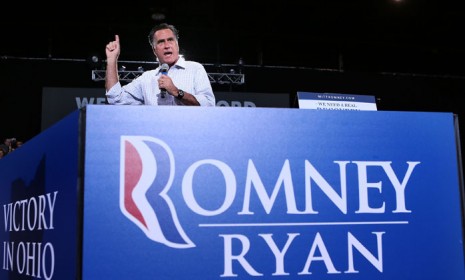Who's politicizing the Libya attack: The White House or the GOP?
Mitt Romney and other Republicans are attacking President Obama for stonewalling on what really happened in Benghazi

A free daily email with the biggest news stories of the day – and the best features from TheWeek.com
You are now subscribed
Your newsletter sign-up was successful
Republican presidential nominee Mitt Romney has returned to hammering President Obama over the Sept. 11 attack on the U.S. consulate in Benghazi, Libya, that killed U.S. Ambassador Chris Stevens and three other diplomatic personnel. After being widely criticized for prematurely politicizing the attack, Romney is now saying that the Obama administration is the one playing politics, trying "their very best to keep the people of America from understanding what happened" in Benghazi. The White House initially described the attack as part of a spontaneous protest against the anti-Islam film Innocence of Muslims, and didn't publicly describe it as a terrorist attack until last week — even though, according to Eli Lake at The Daily Beast, intelligence officials fingered al Qaeda–affiliated operatives within 24 hours of the attack. Romney and other Republicans are also criticizing Obama for his comment Sunday that the instances of post–Arab Spring turbulence in the Muslim world have been predictable "bumps in the road." Barbara Doherty, the mother of Glen Doherty, a security contractor killed protecting Stevens, tells the Boston Herald she's "very sad" her son's death is being used as a political football. But just who's playing politics with the Benghazi attack?
Romney is acting unpresidential: Mitt Romney would be better off just sticking with his economic message, says Scripps Howard's Martin Schram. When he talks up free enterprise, even in the context of foreign aid, he's "impressive." But he shows "poor judgment" when he repeatedly attacks Obama over the murder of Stevens. "What we need least these days are leaders who use global crises to pander, take cheap shots at adversaries, and distort reality." Obama passes that test; Romney doesn't.
"The winner of the first 'virtual' presidential debate is..."
The Week
Escape your echo chamber. Get the facts behind the news, plus analysis from multiple perspectives.

Sign up for The Week's Free Newsletters
From our morning news briefing to a weekly Good News Newsletter, get the best of The Week delivered directly to your inbox.
From our morning news briefing to a weekly Good News Newsletter, get the best of The Week delivered directly to your inbox.
Obama is playing politics, and defense: The White House is the one peddling "misstatements, distortions, and outright fabrications" about what happened in Libya, says Nick Gillespie at Reason. It's not hard to guess why: Blaming "YouTube provocateurs" for the attack "minimizes the administration's responsibility for screw-up after screw-up," most notably the "rotten security" at the Benghazi consulate. Pointing the finger at a lame video instead of U.S. policy also allows Obama to "keep on keeping on" with his "globo-cop" foreign policy.
"The Obama administration didn't want to admit Benghazi was a terrorist attack"
Everybody needs to take a step back: "I've never been to Benghazi, nor have I stepped foot in a safe house," says Marc Ambinder at The Week, but neither have any of the other insta-experts "sitting on our comfortable couches in Washington." Stevens could have been better protected, but he didn't want to live in a fortress, and besides, "Congress (and the White House) are not in the mood to spend hundreds of millions on additional contract security officers." The CIA, FBI, and State Department are, and should be, examining what went wrong. "But rushing to judgment politicizes and compresses what absolutely needs to be an apolitical and judicious process."
"Blame where there is none"
A free daily email with the biggest news stories of the day – and the best features from TheWeek.com
Read more political coverage at The Week's 2012 Election Center.